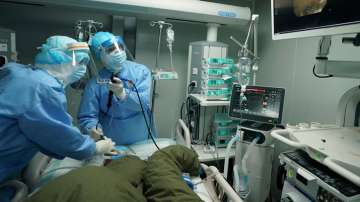Scientists, including one of Indian origin, have identified a pattern of longer-term symptoms likely to be experienced by people hospitalised with the COVID-19 infection, which include fatigue, breathlessness, psychological distress and a general decline in quality of life. The study, published in the Journal of Medical Virology, found that some patients, particularly those who had been in intensive care, had symptoms associated with cases of post-traumatic stress disorder (PTSD).
"COVID-19 is a new illness and we have very little information on longer term problems in individuals after discharge from hospital," Manoj Sivan, Associate Clinical Professor at the University of Leeds in the UK.
"The emerging evidence is that for some, the road to recovery may take months and it is vital specialist rehabilitation is on hand to support them. This research gives an important insight into patient needs, and that will help shape services in the community," Sivan said.
The research team followed 100 people recovering from COVID-19, four-to-eight weeks after being discharged from hospital in Leeds.
The COVID-19 survivors were divided into two groups: those who had become critically ill and needed intensive care -- 32 people were in this category; and those who were treated on a ward without needing intensive care -- 68 people were in this category.
Patients were contacted by a member of the hospital's rehabilitation team and asked a series of questions about their recovery and symptoms they were still experiencing.
The most prevalent symptom was fatigue, the researchers said, adding over 60 per cent of people who had been treated on a ward reported fatigue, and one-third of them described it as moderate or severe.
They noted that for patients who had been in intensive care, 72 per cent reported fatigue. Of those, more than half said it was moderate or severe.
The study found that the second most common symptom was breathlessness.
People in both groups said they had feelings of breathlessness which had not existed before they contracted COVID-19, according to the researchers.
This was higher in the group that had been the most ill, the intensive care group versus those who had been treated in a ward, they said.
The third most prevalent symptoms, the researchers said were neuropsychological.
They found that almost one quarter of the people who had been on a ward and just under a half of the people who had been in intensive care had some of the symptoms of PTSD.
"PTSD symptoms are a well-recognised component of post- intensive care unit syndrome caused by a variety of factors including fear of dying, invasive treatment, pain, delirium, inability to communicate, weakness, immobility, and sensory problems and sleep deprivation," the researchers said.
More than two-thirds (68.8 per cent) of patients in the intensive care group and just under half (45.6 per cent) of the other group said their overall quality of life had deteriorated, they noted.
Latest World News
